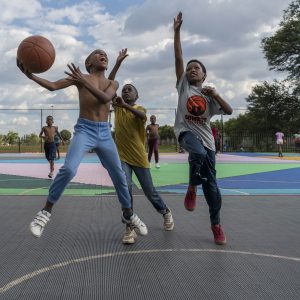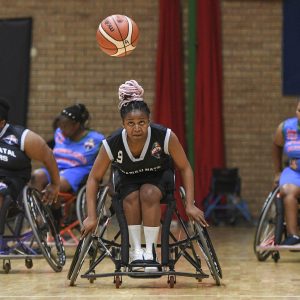Helping women’s wheelchair basketball grow in SA
It was by chance that Ntombizile Mthombeni found herself playing wheelchair basketball. Yet she has gone on to coach many teams and be an ambassador for the sport in South Africa.
Author:
27 August 2021

The year was 2005 and Ntombizile Mthombeni was with her child, Tshepiso, at Gelukspan Hospital in Mafikeng when she accidentally came upon a wheelchair basketball match at a nearby court. Curious and intrigued, she asked if she could join as an able-bodied player.
Hers was an unconventional entrance into wheelchair basketball, and that is part of the fuel driving her not only to excel in the sport but also to help grow it. The sport’s open-door policy meant her first taste of club-level playing came in the Provincial Club Championship League (PCCL) when she featured for a team called Mongoose. But she mostly played friendly games.
She was on the roster at intervals for 10 years, often taking time off to take care of her child – who has cerebral palsy – and grow her baked-goods business. Women’s wheelchair basketball was not on the radar at the time and there was no dedicated national league.
‘From player to coach’
In 2015, Mthombeni made the transition from player to coach. The change was ignited by an invitation to join a coaching course from a friend. She underwent the training for a month and, by the end of that year, she was hired as the assistant coach of the North West province in the Vodacom Wheelchair Basketball Challenge. There she worked alongside Lydia Dumond. And, during the 2016 finals rematch between the North West and Gauteng, she temporarily filled the role of head coach as Dumond was out of town.
Mthombeni led the team to a decisive 58-42 victory over the defending champions to win the championship. The victory was a massive confidence booster and it gave her a renewed sense of purpose in wheelchair basketball.
“People don’t know about wheelchair basketball. They don’t know that we exist and don’t know much about our sport. But we are dedicated and passionate about the game of basketball,” says Mthombeni, now head coach of the North West Stinging Bees, four-time champions of the National Women’s Wheelchair Basketball League (NWWBL).
Related article:
But that is not the only team she coaches. In the PCCL, Mthombeni also heads Mongoose. She currently serves as the head coach of the South African Women’s Under-25 wheelchair team as well, and is the assistant coach of Amawheelagirls, the senior national women’s wheelchair basketball team.
She is determined to raise the status of wheelchair basketball in her province and the country. Her pedigree as a head coach is impressive. She is the leader of the most successful team in the NWWBL. She also helped the Under-25 team qualify for the 2019 Women’s World Championship, making it the third time they have competed on the international stage. And, under her, the team now ranks sixth in the world.
Her coaching philosophy is simple: it is to encourage and train her players hard, be they men or women. Talking about the differences between being a player and coach, she says, “When you coach, you see basketball differently. You are thinking about your players and how they can improve on the court. You are able to read the game and have a lot more control of it. That part is exciting.”
Learning from the best
She was appointed as head coach of the North West Stinging Bees in 2016. Her first international competition as head coach came with the Under-25 national women’s side that travelled to Thailand for the Wheelchair Basketball World Championship in 2019. There she gained valuable experience, and illuminating and educational exposure, she says.
As a coach always seeking to improve, she used the tournament as an opportunity to get pointers from her peers. One coach who was particularly willing to help her was Trooper Johnson, National Wheelchair Basketball Association Hall of Famer and head coach of the United States women’s national wheelchair team. He saw the potential of the team and noted they needed polishing in their shooting and speed.
Scott Wallace, head coach of Great Britain’s Under-23 men’s team, came to South Africa on multiple occasions and hosted camps. He has taken time to advise her on setting up practice sessions and outlined areas to focus on to improve her team.
“When you go out there, you meet other coaches and you find out that there are so many things we don’t know. They are so much more advanced and I learnt so much. My team is young and they are still developing. If we develop more, we can have a strong team that can go on to play for the national team,” she says.

The South African senior women’s team excels on the continent and currently ranks second in Africa behind Algeria. They won the 2019 Lwini Cup in Angola and collected silver at the 2020 Africa Wheelchair Basketball Championship. They have, in the past, qualified for international tournaments like the International Wheelchair Basketball Federation’s Americas Zone in Guatemala in 2011 and Mexico in 2013. They achieved a silver placing in both, losing to Brazil and Mexico respectively.
Mthombeni says in order to qualify for the World Championships, South Africa was allowed to participate in the Americas Zone as “there were no other African countries that had women’s teams”.
Amawheelagirl failed to qualify for this year’s Paralympics in Tokyo. The team has never qualified for the premier competition, which Mthombeni says is because of a disparity of skills between South Africa and other countries. The country does not have enough skilled players to compete.
This can be fixed, she says, by developing young players. She has shown her commitment to this by bringing younger players with potential into the national Under-25 women’s team. She discovered Emihle Mbotho, for example, at a school tournament and was impressed by her abilities. Mthombeni placed her in the Under-25 lineup when she was just 16 years old, making her the youngest member on the team to travel to Asia.
Men’s versus women’s teams
Her next mission is to close the gap between women’s and men’s wheelchair basketball. The NWWBL as a dedicated league for women has helped increase participation in the sport. It allows younger players to see the access and opportunities in wheelchair basketball.
For Mthombeni, the next step in growing the sport is in garnering more exposure. When Mongoose went to the Junior NBA programme in 2019, many of the other teams and players at the event were unaware that wheelchair basketball existed. Even in cases where people know of the sport, they often are conscious of only men’s basketball. It is, after all, more visible. Men’s games are aired on SuperSport and attract more publicity and sponsorship.
“We definitely need more exposure. Not a lot of people know much about disabled sports. Most of them were surprised and some of them had never seen it,” said Mthombeni. “We are trying to bring the ladies to the same level. Before, the ladies were left out and they didn’t have their own league. Now the women are playing but the stadium is not that full in comparison to [when] the men [play].”
Related article:
Mthombeni also said that women’s wheelchair basketball does not get support from local sports bodies. She said that after several appeals and requests to Shadrack Moepeng, chairperson for Wheelchair Basketball in the North West, to get funding or equipment for the provincial team, she was met with indifference. Mthombeni has had to be resourceful and often borrow equipment from the men’s team.
“We really do not get anything and it’s been like that since I started. When the boys go for these tournaments, they get everything, from tracksuits to equipment – and we don’t even get a single T-shirt,” Mthombeni said.
Despite the many challenges, Mthombeni is optimistic about the future of wheelchair basketball. Her journey as a coach has made her a better person and a better parent. Training and working with para-athletes has informed how she approaches raising her child too.
“I never thought my child could be independent,” said Mthombeni. “I didn’t think she could feed herself or change her clothes. I used to do everything for her. But being a coach, I can see what she is capable of. The thing I know about disabled people is [this]: don’t feel sorry for them because they can do so much.”


